


 |
 |
 |
|
|
||
| Cherokee
County Families
|
|---|
 |
Memories and Stories |  |
| Richard D. Cleaves From My Past: Cherokee, Iowa to New York City 1909 to 1933 |
21. Fire Escape Chutes and “Toots” My mother used to dress us up unlike any other boys in the town, with Dutch hats, shorts, and Dutch costumes. There are pictures of us as we looked then. We were known as ‘sissies,’ because we were on the other side of the tracks, my dad was a doctor, and we had these outlandish costumes, so everybody used to pick on us. First, I should explain that at the schools they put in fire escapes which were chutes that went from the second floor and were big round cylinders. If there were a fire, you were supposed to slide down. We found that if we got some wax paper from bread, we could wax the chute so you would go much faster. We would wax them and then we would walk up the chute by keeping our feet on the sides where there was no wax. Then we could slide down. One time at one of the schools (I can't remember, Webster I think) before school was out, my brother Prent unlatched the door at the top of the chute and later that evening we went in. (Chuck Seaman I think was there with us too; in fact, there about five of us.) We walked up where it wasn’t waxed, and we went into the school. We went around and changed books around and we put things on the blackboard and so forth. Then we left. It happened that after that, some of the bigger boys went into the school and vandalized it. Then it came out that we had been there as well as the other boys. We were taken down to the high school where a group of the local citizens were. My dad said that everybody else had one child and he had two! I remember that they read us the law for breaking and entering and how that works with so many years in the penitentiary. Finally, they put us on probation -- we had to be in our houses every night at 7 p.m., a curfew I think for a month. Webster School and Fire Escape Chute I’m getting ahead of my story because what I wanted to tell was that Prent and I one afternoon were at I think again at Webster School. We were walking up the chute with our feet on the outside and sliding down. One of the bullies of the town named Toots (can't remember his last name) came along and he took our shoes-- because we’d taken off our shoes to get up there. He was going to take them -- he was just bullying us. Prent said, “Look, I’ll dive at his feet and you push him over.” So Prent dives and grabs his feet and I push him over. We both got on top of him starting to beat him up. Roy Connelly, another one of the older boys who was known as a real tough guy, saw all of this and he came over. Toots said, “Come on Roy -- Help me! Help me!” Of course, we were scared that Roy would enter into it too. He just said, “No, Toots. You got yourself into this and you’ve got to get yourself out.” We let Toots up, finally. After that we never had any trouble with any bullying because they knew that between the two of us, we could handle any situation.
There was a fellow in our class named Ferol Christensen. He was on the basketball team. He was taller than the rest of us, but he never got in next to the basket. He was always the guy who got out of the middle of the floor and let fly with a long one but never made any at all -- maybe he made one and that kept him going but nobody could cure him of it.
Ferol brought in a bottle of skunk oil and put it all sealed up in his locker. The school principal was named Bates. He had taught in a private school and so instead of calling him “Mister” we called him “Master,” which he didn’t like. Some way he found out about the skunk oil. He went into Ferol Christensen's locker, took out the skunk oil, took it outside and emptied it right in front of the intake fan for the ventilation system for the whole school. The school had to be let out for three days before they could get the skunk scent out. The bad thing that they did was to suspend Ferol Christensen for a year. Of course, he shouldn’t have been suspended because it was a stupid idea of the principal that caused the whole problem.
(Click photos to enlarge) 22. Stairway Misstep There was a fellow in Cherokee who ran the Firestone station. Cherokee was a small town and everybody knew everyone else. It was his wife's birthday, I believe, and he decided to have a surprise party for her. He had advised her that they were going out to dinner. She was upstairs getting ready and he was down in the parlor with all the friends invited to the surprise party who had sneaked into the house. They were all sitting around in the living room waiting for her to come down. She suddenly appeared at the top of the stairs in her brassiere and a pair of panties.
She called down to him, “Oh honey, would you like to tear one off before we go?” Of course, that became the joke of the town. For instance, Dad would go into the Firestone station and say, “Oh honey, do you have any tires today?” Finally, it got so bad that they moved out of town because everybody was kidding him so. 23. Dad Drinks Straight Alcohol Dad was the youngest of six children in Cook County and was only nine when his father was drowned in the Chicago River. Benjamin had gone through the Civil War in the artillery brigade without a scratch and then had his arm blown off while ramming the wadding in a cannon at a Fourth of July celebration. At the time of his death he was working at a bank and tried to leap across a swinging bridge before it was closed, missed, and fell into the river. My Dad said that, having only one arm, he could swim only in circles and went under just before a boat reached him. I was always a little skeptical of the story, and one time in that connection asked Father, “Did Grandfather Benjamin drink?” My father got furious at this, plus the fact that my father never drank – beer, cocktails, wine, nothing -- and never served liquor in our house made me think that perhaps my question hit a nerve. 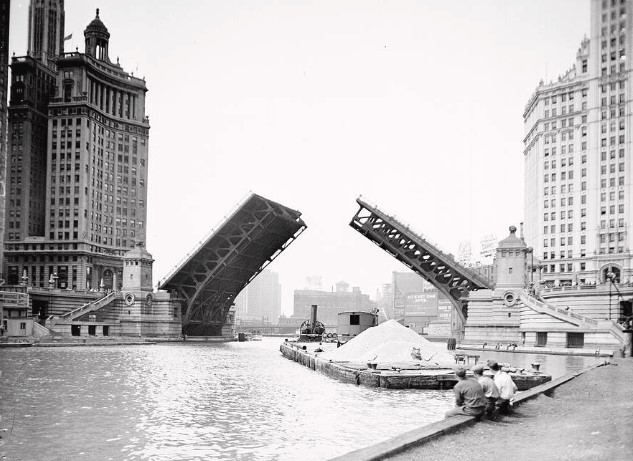 Never drank? I know of two occasions when he did. The first was when he was in a hotel room in Sioux City where the American Legion was holding its Iowa State convention, and where everyone but he was drinking spiked near beer, the most popular Prohibition drink among Iowans. It consisted of near beer and grain alcohol. You opened the bottle of near beer, either drank some or, more usually, poured some on the ground or in the sink, as it tasted horrible, and filled up the neck with 180-proof alcohol. You put your thumb over the top, turned the bottle upside down a couple of times and there was the making of the most horrendous hangover that one could imagine. Anyway, the conversation turned to Dad, and they started baiting him about being such a softy that he wouldn’t take a drink. Something was said that made him mad, and he said, “All right, you bastards, let’s see any one of you do this!” He went to the bathroom, got a water tumbler and filled it half full with straight alcohol. He gulped it down without choking and said in a normal voice, “Any takers?” No one spoke. Dad turned and left the room. I had heard the story as it was the talk of Cherokee. So, one day at his office I said, “How did you do it, without choking or coughing?” “Well,” he said, “it’s a matter of being able to get it down without getting fumes in your lungs. It blisters your throat, but I just went and threw up and that was it. Here, I’ll show you.” He unlocked his medicine cabinet, filled up a tumbler with alcohol, slugged it down and then got rid of it in the sink. Drinking Spiked Near Beer during Prohibition 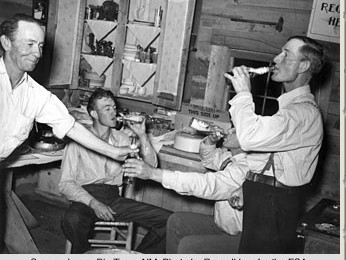 24. One-Nut Cleaves I came home from college one summer and when I got home Mother said “Your father has been sick for a week or so and he's up in bed and he won't get another doctor in to look at him. I think you should go up and talk to him.” I went up, and Dad was in bed and quite pale and we talked. I said “You don’t look well. I know you doctors don’t like to get treatment from other doctors. But why not get Doc Hall or somebody over here to take a look at you and tell you what's the matter?” He said, “Well, I’ll tell you. I had an infected testicle, and I wasn’t going to have someone else do the operation. So I operated by myself and removed the testicle...I'm just recovering. The reason I did it was because I wasn't going to be known around Cherokee, Iowa as ‘One Nut Cleaves.’” 25. Confused Couple Doctors ethically don't talk about their patients, but Dad did take me into his confidence a few times. One of the most interesting stories was about a girl in high school who was maybe three classes ahead of me and came off a farm. She married a boy from another farm, and they didn't have any children, and didn’t know what was the matter. Someone suggested she be examined so she came down to Dad's office. He examined her and when he got through examining her, she said “Why did you examine me there?” He said, “Where would I exam you?” And she said “Why, back here,” pointing to her rear end. Of course, they were both innocents -- farm boy and farm girl -- who had always seen the animals enter from behind. They thought that was the way you did it. Well, nine months later she had a baby. They thought Dad was the greatest doctor in the world. Once a week this guy would come around to the side door of the house up on West Main Street, bring us some butter and eggs and things like that out of gratitude for what Dad had done. Dad got a lot of produce particularly during the Depression. He was funny and he had strange ideas. For example, I remember he didn't send a bill to anybody for over 20 years. One day we were at the house. He was about to leave for work and mother said “Prentiss, I have to pay the mortgage today but I don't have any money. I'm really concerned about it.” He said, “Don't worry about it.” And she said again, “But I need to get to the bank today and pay the mortgage.” He repeated, “Don't worry about it” and off he goes down to his office. Cherokee State Bank, founded 1908, at Smith Ave. and George Ave. in 1920 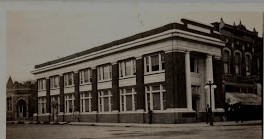 I went down to his office a little later and I'm sitting there when a farmer comes in and says, “Good news, Doc. I just sold a load of corn. I got a good price and now I can pay you for your delivering my wife last time.” Dad said, “Just forget it.” And the fellow said, “No, I’m not going to forget it; I want to pay you. I have the money right here.” And Dad said, “Forget it.” The farmer walked out with this money in his pocket and Dad didn't collect. I think he did this to impress me. I could never understand anything like that. He was a brilliant doctor and very fine man but had strange ideas as far as money was concerned. 26. Cherokee High School I graduated from Cherokee High School in 1925.
Prent and I had been in the same class because I had skipped a grade and he didn't. He just didn't want to be in the same graduating class. So, he went to Chicago and went to Francis Parker School. I had been a pretty good football player in Cherokee and so when Prent went to Francis Parker he apparently carried my reputation and told them what a great football player he was. He played all of the first game and he played a half of the second game and he played a quarter of the third game at Francis Parker. After that he was off the team. He never played again. I'll never ever forget our commencement address at Cherokee High School. The speaker was an educator -- superintendent of school or something from Iowa someplace. In his talk, one of those inspiring things was “You think you're when you are leaving high school that you reached the end of a very important time.” And then he said “Why do you suppose they call it Commencement? It's called Commencement because after you get out of high school is just the commencement of the rest of your life” and all that sort of stuff. At the end of his speech he said “Now I have a special message for you boys in the class. A few weeks ago, I was up in a town in Northwest Iowa where they had a tornado that had taken down a lot of trees. I came out of my hotel in the morning to take my morning constitutional and I looked down and they had planted trees. It was really quite inspiring – long row after row of trees, pines on each side of the of the street, each tree with just exactly the same height. But as I looked down the street and was walking, I saw one tree way down at the end that was much smaller than the others. I just couldn't understand, so I walked down and found that it wasn't the tree at all. It was a fire plug.” He ended by saying, “Boys, don't be a fire plug.” I'm sure that Prent and I were not the best-behaved students in high school. We got in some trouble and we escaped a lot of trouble maybe we should have gotten into trouble for. One time Prent was out on a field trip for a biology class, and he saw a big black snake which is a harmless snake in Iowa. He brought it back to school and just before walking into assembly, he put his hand into his pocket and held the snake inside his pants by the tail from his pocket. As he walked into the assembly, he let the thing go. You could just follow that snake in the assembly by the girls that would jump up and get on their chairs and scream. Finally, the teacher who was monitoring the assembly came down and she saw the snake. She said, “Who brought that snake in?” Of course, nobody answered, so she said -- “Prentiss Cleaves, you take that snake and get rid of it.” Prent said “I’m afraid of snakes.” So, she said “Richard, get that snake out of here.” I said I can’t touch a snake. Finally, Clarence Allison picked up the snake and threw it out the window. One summer Irene had wanted to take me someplace -- I can't remember if it was Niagara Falls or some other place. She wanted to go before I got through school that particular year. So, we got permission for me to leave school a week early. I was in the assembly one morning and there was some kind of commotion that I was causing. The teacher monitor said -- “Richard - take that front seat.” I walked up to it and stood there and said, “Where should I take it?” Well, of course, I had to go to the principal's office, and he gave me a lecture. He then said, “We've been lenient with you, letting you go early and now you can't go.” Well, that upset everything and finally I guess Dad or Mother went down to talk to him and he let me go anyway. A trick that we had in class (I think it was in Miss Mann’s class; she was an English teacher, an excellent English teacher). We would sit in the back row which is right up against the wall. When she wasn't looking. we would bang our heads back against the wall. This made a pounding noise. She would stop and say, “I wonder why they're pounding out there,” and then she goes on with her classroom teaching and we do it again. She never did find out that we were doing it in the back of the room. As I said, Miss Mann was a wonderful English teacher. She would read Shakespeare to us, and she would act out all the parts. I remember one time in one of the Shakespearean plays, she pretended to be knocking on the door saying “knock knock knock,” and then she walked over to the other side and said “Who is there?” Then she walked up to the first side of the room and answered whatever it was. As she was going back again to take the other part, she hit the wastebasket. She looked down and said, “Excuse me.” We all got a big kick out of that.
And a Lasting Impression 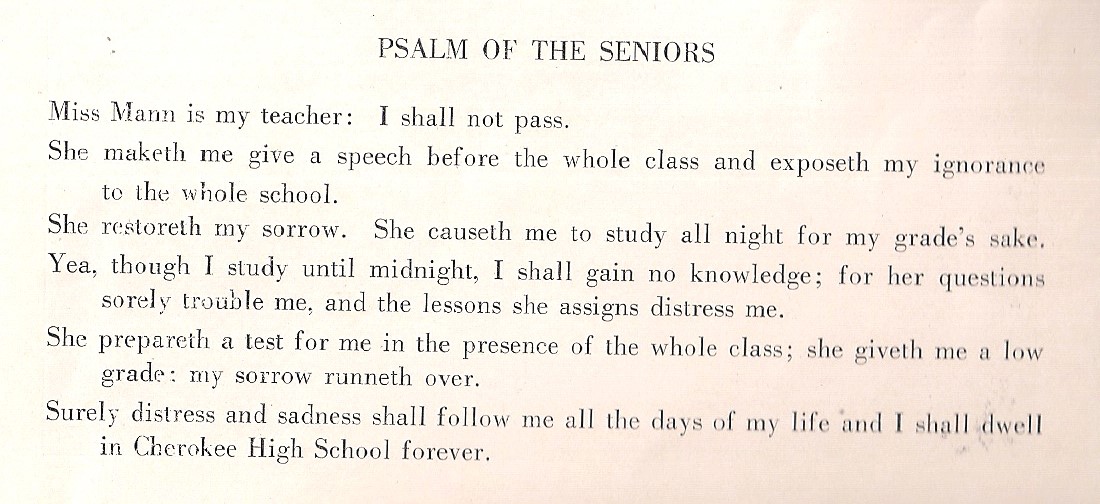 [Editor’s note: Until the editors prepared this memoir, they did not know that their father Dick graduated twice from high school. In 1925 he was just 16 years old when he graduated from Cherokee High School. His parents felt he was too young for college. They sent him up to Francis Parker School in Chicago where Aunt Irene was still the respected 8th grade teacher. Like his brother Prent, he lived with Aunt Irene, played football, and graduated in 1926. Still only 17 years old, he then went to Switzerland to take courses at the University of Geneva, afterwards teaching physical education at a French Girl’s school. He entered Dartmouth College in September 1928. We believe he received financial support for going to Europe and attending Dartmouth from Cleaves aunts living in Maine.] Dick Cleaves Returns To Frances W. Parker School 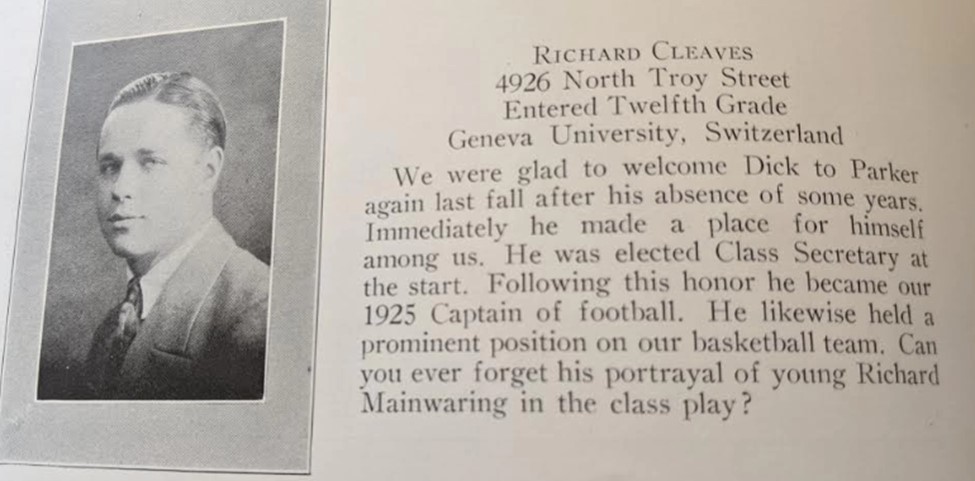 (Image source: Francis W. Parker School "Record") 27. Flying Lesson and Switch Engine with Prent Prent took flying lessons and became a pilot. He was working in Wichita and he flew back to Cherokee. In those days, when they flew cross country, they had no navigation aids at all. They would fly along the railroad tracks and then when they got near a town, they would fly down low enough so they could see the name of the town on the railroad station. One year, Prent was in a single-engine plane that had a rotary motor with 6 or 8 cylinders around the engine with the drive shaft in the middle. One of the things that he did that I couldn't do -- he wanted to teach me to fly. We went out to the field one day and took off. I was in the co-pilot seat, and he turned the controls over to me. He said, “You pull the stick back a little bit to go up and you put it down a little bit to go down. And if you want to go right to put over to the right if you want to go left you pull up the other way.” I thought I was doing pretty well and suddenly he said, “Let go of that stick!” I let go and he took the stick and went back to the airport to land. I was a little bit upset because I said to myself what am I doing wrong? I must have been really terrible. Prent landed and shut off the engine and said, “I want to show you something.” We went down and he pointed to the engine and said, “The engine has four bolts. Three of the bolts had sheared off, and the cylinder was just loose there. If the fourth bolt had come off, the cylinder would have come right through the cockpit.” That was my only flying lesson and the end of my flying experience. Prent was always mechanically very skilled and very interested in mechanical things. When we were quite small, maybe 11 or 12 years old, Prent used to go down to the railroad yards. The engineer on the switch engine let him get in the cab and they’d switch and so forth. Prentiss Bowden Cleaves 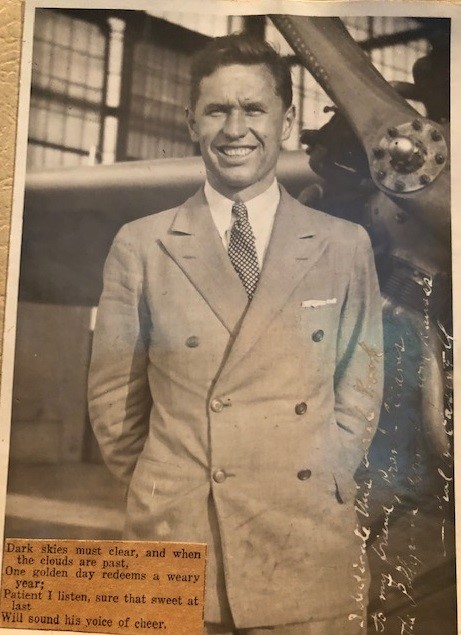 Prent learned how to run the switch engine. One day we were walking down across the tracks and the switch engine was sitting there and the men were in the railroad restaurant, the crew having something to eat. And Prent said, “You know, I can run this engine.” There were three of us -- Tony Rassis was there too. We said, “You can’t,” and he said, “Come on, I’ll show you.” We got in and he started the switch engine down the track. The crew inside the restaurant looked out and suddenly saw their switch engine disappearing. Prent took it down maybe 200 yards, put it in reverse, and brought it back again. That was the last time they ever let him ride in the switch engine. Switch Engine 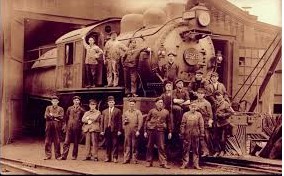 [Editor’s note: Prent Cleaves was born in Cherokee on January 15, 1908. His career was in the airplane industry in San Diego, California. He invented and patented a spoiler system fitted to wings of small planes like Piper Cubs to smooth their landings. Prent died in San Diego on February 10, 1980.] When I was working for Guy Gillette, I bought a Ford Phaeton, which was a 4-door convertible. Prent wanted to fix it up and did a terrific job. He built a deck over the rear seat which had latches on it and he got a pump (I don’t know what kind of pump it was) and he linked it up to a Franklin automobile compressor. The old Franklins used to have a compressor underneath the hood so that, if you had a flat tire, you could inflate your tire. Prent fixed this thing up so it would work on the pump and lift this deck so you can get in and out of the back seat. We also put glass wings on it, at the side of the front windshield. And we had the second windshield on the deck. So, we had a two-windshield car which was really a very classic car.  That was the best car I ever had. Whip Walser, Bill Kass and I drove the Ford Phaeton down to Laredo before we rode bicycles to Mexico City. We left it there and Prent picked it up and took it to California. I wish I had it today because it would be a real classic, almost unique. There’re just not many more now. A 1934 Ford Phaeton. 28. Hawkeye Limited Train and Cattle Car Dad was the doctor for the Illinois Central Railroad there in Cherokee. We could get passes. For instance, Dad got me passes and I would come back and forth from Dartmouth. I'd ride the Erie Railroader I guess to as far as Chicago and then I would ride the Hawkeye Limited, which was the crack train from Chicago to Cherokee. Erie Limited between Jersey City & Chicago, 1930s
The Hawkeye had the old Pullman cars, beautiful Pullman cars, and an observation car. It went from Chicago to Cherokee where it split into two sections -- one going to Sioux Falls and the other going to Sioux City.
The farmers, of course, used to ship their cattle into Chicago on the IC. When you accompanied the cattle, you got a pass back on the Hawkeye Limited with a berth. The ones who rode the train with the cattle didn't have to do anything really with the cattle but sit. We used to ride the cattle train into Chicago riding in the caboose. The first time I took it, they had a hundred cars, which is 99 cars and the caboose. We would be on the rear platform on the caboose, with our legs dangling over the rear and leaning up against the rails. Riding the Vintage Caboose
The train would be going along through the country and it was just beautiful, sitting out there in the sunshine, everything was just great. But when the train pulled into the station or a town and slowed down or stopped, there was a little space in the coupling between each car. When they put on the brakes on the train, the cars would take out the space in the coupling and by the time it came to the caboose, the assembly came to a complete stop -- very suddenly -- about maybe three feet of space taken out. And when they started out it would do the same thing. You'll be sitting there and suddenly you get jerked up against this rail. By the time they reached the last car the train was probably going 60 or 70 miles an hour. It was really quite a shock. Through the towns, when you were carrying hogs, they would water down the hogs. We'd be sitting in the caboose while some of these men would be on the side with a hose watering the hogs. Of course, we got watered too because they just loved to squirt the water hose on us when we were sitting in the rear of the caboose. Modern Train Hog Watering 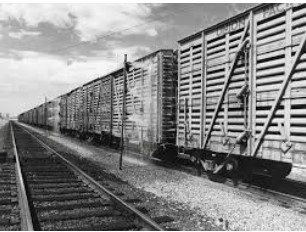 29. Chicago World’s Fair Contortionist I think it was in 1934 when they had great dust storms over the plains. I was working with Guy in Washington, and I drove Guy and Rose and little Mark back from Washington to Cherokee. It was so hot (and of course we had no air conditioning in the car) that we couldn't open the windows because it was hotter with the windows open than it was with them closed. On the way, we stopped at the World's Fair in Chicago where there was a contortionist.
It’d been a long ride and it was hot, and I guess I was a little susceptible. It was while this contortionist went through his act that I fainted. They took me to the emergency place to revive me and I came to. Of course, I was quite ashamed of myself. I said something to the nurse, and she said “Well, out here at the Fair, we have more men fainting and we do women.” A friend of mine -- can’t remember his name now – he worked in Chicago and things were very tough. He had a wife and a baby. He got his pay, and on the way back he got in a poker game. He lost practically all his money and, ashamed, he just didn’t dare go home. So, he went to a pawn shop bought a cheap revolver. Then he went down and bought a ticket on the Sightseeing Boat that came out of the World's Fair and went around the municipal pier and out to Lake Michigan. On the boat he held up all the passengers for money. Of course, he didn't get away with it and they threw him in jail. There was a lot of coverage in the Chicago papers. They didn't know whether to charge him with attempted robbery or with piracy -- because he'd been on the “high seas” on the lake. I guess he got off on probation. Whaleback 1934 World’s Fair Sightseeing Boat “Christopher Columbus” 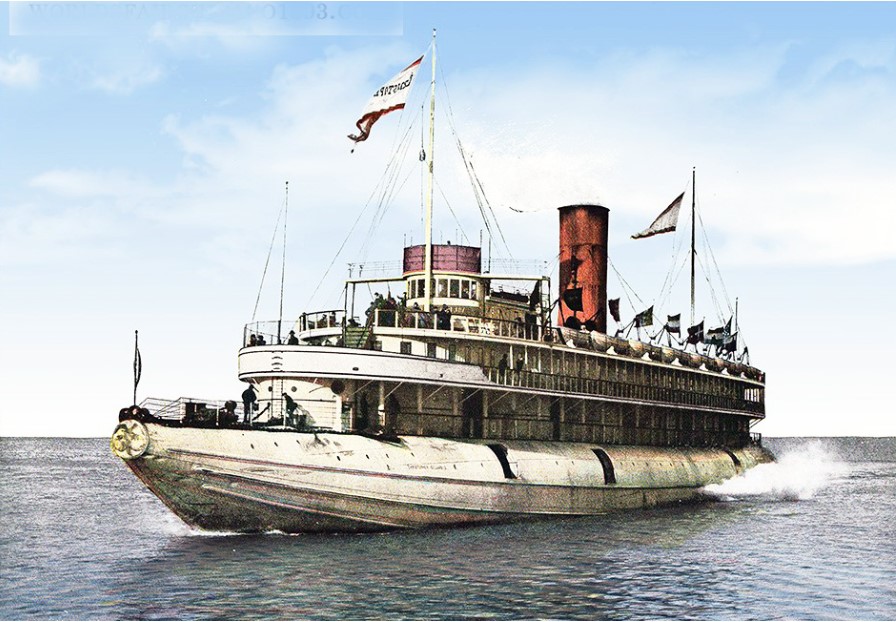 30. Cherokee Dust Storm, County Sections, Drummond Island When we got to Cherokee, the dust storm was just amazing. You would be looking up from our house onto West Main Street and suddenly it would look as if there was a tremendous thunderstorm coming, just solid dust. It would drift over the town, and it got so dark that they had to turn on the street lights. My mother who was a very meticulous housekeeper had a heck of a time with the dust. Almost every day she was dusting. Even though we had storm windows on, the dust still came in the house. We had an apple tree in the backyard. It was so hot that on the sunny side the apples became half baked; that half of the apple was just like a baked apple. Out at the State Insane Asylum, which was also a farm, they had their hay in the hay mount in the barn. On a very hot day, the manager of the farm got a ladder and climbed up the ladder to the hay mount opening. He stuck in his hand with a thermometer to get the temperature. When he took his arm back, it was all blistered. It was just a terrible situation. The land in Cherokee County and I guess mostly throughout Iowa is laid out in sections which are one-mile square. All the roads run along between the sections. If Dad got a call from somebody, he’d say “Where do you live out in the county?” And they could tell him exactly. ‘You go 9 miles north, 2 miles east, one mile north and a mile east and it's the third house past that line.”
Toward the end of his doctoring, he really had had his belly full, with calls at night and all that sort of thing. He would get a call and I’d hear him say “Well, I don’t know you.” Then he would say “Who's been your doctor?” Then he would say, “Well, I suggest you call him.” In other words, he was not interested in enlarging his practice and wouldn't take a patient from another doctor. We had a rustic cabin on Drummond Island in Michigan. We always had a great time, did a lot of fishing. I still have the picture of coming back one day with about 200 perch on a string. Another day we went over to Harbor Island -- of course we didn’t have any motors --- and we had taken food to cook. But when we got over there, we were so tired and hungry that all we ate was peanut butter and baked bean sandwiches. DeTour, Harbor Island, and Fishing Perch on Drummond Island
There was an Indian there -- John Lapointe -- a little man --- and Dad met him and said “Let me look at your eyes. Can you see anything?” And John said, “I can’t see hardly nothin.” Dad said “You’ve got cataracts. Would you like to have me fix them up so you can see?” John said “Fine.” Dad of course didn’t have any of his instruments with him so we went over to DeTour on the ferry and he went to the local doctor and explained the situation, saying he wanted to do this operation, to be done for free, for charity. He got the instruments from this doctor and went back. He operated on the cataracts the old-fashioned way (not how they do it now) and cleared up both cataracts for him. Of course, John LaPointe was very grateful.
Dad also operated on a female Pointer puppy we had in Cherokee after I started working for Guy Gillette. We wanted to have her neutered before taking her back to our house in Washington. Dad said, “I can do that.” He put her under and operated on her. I stood and watched, giving some help (little help really). When Dad finished doing the neutering, he kept working and finally said “I've never done this before. I can’t find some of the blood vessels and she’s hemorrhaging. There's nothing I can do except sew her up and see whether everything’s all right.” So, he sewed her up, and later that day he saw the local veterinarian and explained what happened. The vet said, “You don't have to tie the blood vessels on a dog. I operate on them and then close them up and they coagulate and heal themselves.”
|
|||||||||||||||||||||||||||||||||||||||||||||||||||
Return to Table of Contents Return to Families Index Return to Home Page